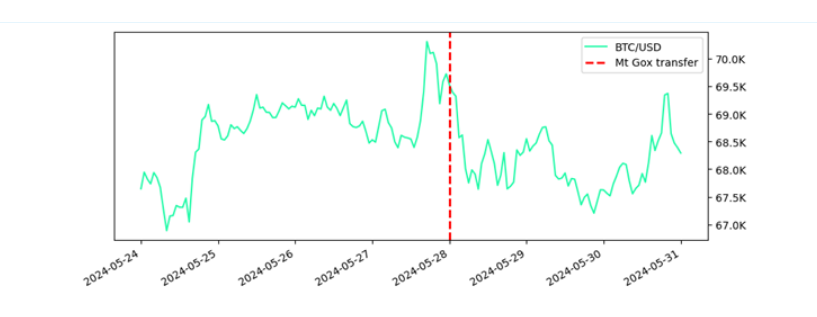Bitstamp Monthly Briefing – May 2024

Welcome to Bitstamp’s May Monthly Briefing! Each month, we select and detail key developments in the cryptocurrency world, providing you with both insights and a preview of what lies ahead. In this edition, we're diving into the Mt. Gox history, recent developments, and a selection of topics that intrigued us the most for further reading.
Let’s get straight into it.
Market update
The total crypto market cap increased by 12.7% month-over-month, reaching $2.45 trillion at the end of May. Trading volume on the leading crypto spot exchanges we monitor saw a 19% decrease during this period.
BTC's market dominance decreased by 0.6 percentage points month-over-month to 54.2%.
Total crypto market cap (grey) and BTC dominance (green)

Past performance is not a reliable indicator of future results. The performance of crypto assets can be highly volatile. Data taken on June 1, 2024.
Source: Total crypto market cap, Bitcoin dominance
Top performing CMC 100 assets in May
- + 131.2% Pepe (PEPE) – Pepe continued with a strong rally after the price broke the previous ATH set in Mar-24.
- + 99.2% JasmyCoin (JASMY) – Jasmy initiated a 100m coin lock up and announced partnerships with TEN and JANCTION.
- + 66.8% Ondo (ONDO) - On May 22, Ondo Finance hit a new peak in its total value locked (TVL), soaring to $453 million.
Worst performing CMC 100 assets in May
- - 21.6% Pyth Network (PYTH) – On May 20, 2.13 billion PYTH tokens were unlocked, increasing the supply and selling pressure.
- - 15.7% Cronos (CRO) - the price declined after it failed to breach the $0.13 resistance level.
- - 15.2% Stacks (STX) - the price declined after it failed to breach the $2.2 resistance level.
Past performance is not a reliable indicator of future results. The performance of crypto assets can be highly volatile. Data taken on June 1, 2024.
Key macro & crypto events in June 2024
- June 5-6: Blockchain Expo in CA, USA
- June 11-13: XRP Ledger Apex 2024 in Amsterdam, Netherlands
- June 12: US Core Inflation Rate
- June 12: FED Interest Rate Decision
- June 13-15: BTC Prague 2024
- June 19: BTS – Banking Transformation Summit in London, UK
- June 19: Nordic Blockchain Conference 2024 in Copenhagen, Denmark
- June 20: ECB General Council Meeting
The rise and fall of Mt. Gox
Mt. Gox, originally created in 2007 as a platform for trading Magic: The Gathering cards, pivoted in 2010 to become one of the earliest Bitcoin exchanges. Under the ownership of Mark Karpelès from 2011, Mt. Gox rapidly grew to dominate the Bitcoin trading scene, handling over 70% of global Bitcoin transactions by 2013. Its prominence helped drive early Bitcoin adoption and significant price volatility, making it a central player in the nascent cryptocurrency market. However, vulnerabilities and mismanagement loomed beneath its success, eventually leading to its downfall.
In February 2014, Mt. Gox abruptly ceased operations, filed for bankruptcy, and revealed that 850,000 Bitcoins—worth approximately $450 million at the time—had been lost, allegedly due to long-term hacking. The collapse triggered a severe Bitcoin price crash and widespread fear, uncertainty, and doubt (FUD) about the security of cryptocurrencies. Investigations revealed extensive mismanagement and security flaws within the exchange. While some Bitcoins were later recovered, the majority remained missing, leading to prolonged legal battles and a complex bankruptcy process that left many creditors in limbo.
Finally, in late 2021, creditors and the Tokyo District Court agreed on the Mt. Gox rehabilitation plan, closing a seven-and-a-half-year legal battle. The repayment deadline has been moved several times since, the last time in September 2023, when the rehabilitation trustee changed the deadline from October 31, 2023, to October 31, 2024, respectively.
On May 28, 2024, wallets belonging to the defunct Mt. Gox exchange transferred over 140,000 Bitcoins, valued at around $9 billion, to a single address as part of repayment preparation plans to creditors. This transfer, carried out in thirteen transactions, caused Bitcoin to drop by 1.4%, from a high of over $70,000 to as low as $67,680, reflecting market concerns over potential selling pressure, even though the actual repayment hasn’t taken place and despite assurances from rehabilitation trustee Nobuaki Kobayashi that no immediate sale would occur.

It's important to note that roughly 65,000 BTC/BCH will be returned to 20,000 individual creditors in kind from now until September and that based on conversations with larger creditors by Galaxy Research’s Alex Thorn, significant selling is not the be expected. Albeit Thorn’s thesis on the distributions is different from other research firms, many of which have said that they expect pressure on bitcoin’s price, the market's bearish reaction underscores the lasting impact of Mt. Gox on market psychology and the general assumption that the repaid BTC funds will get liquidated once distributed.
In the grand design of the rehabilitation process, Bitstamp is supporting the rehabilitation process for Mt. Gox creditors as one of the Designated Cryptocurrency Exchanges.
Recommended reads
The Dawn of Bitcoin Programmability by Multicoin Capital
This blog post argues that to unlock DeFi on Bitcoin, developers need to enhance its programmability on Bitcoin’s L1 rather than focus on scaling. For nearly a decade, Bitcoin has been seen as digital gold, focusing on being a non-sovereign currency rather than enhancing smart contract functionality. The Bitcoin community decided to prioritize its main goal over programmability, leading to the rise of Ethereum and other smart contract platforms. With the Taproot upgrade in November 2021, Bitcoin gained more smart contract capabilities, enabling complex functionalities like atomic swaps, multi-signature wallets, and conditional payments. The introduction of "Ordinal Theory" in July 2022 further expanded Bitcoin's potential by allowing fully on-chain NFTs.
Porter’s Five Forces and Competitive Advantage in Web3 by a16z
Competitive strategy is crucial for platforms, especially in web3, which transforms competition and collaboration dynamics. This article looks at web3 through the lens of Michael Porter's Five Forces Framework—competitive rivalry, threat of new entrants, threat of substitutes, bargaining power of suppliers, and bargaining power of customers. In the context of web3, competition intensifies across all these dimensions due to decentralized networks, open protocols, and shared ownership. While web3 increases competition by making it easier for new entrants to leverage existing protocols and user data, web3 also offers opportunities for value creation through user incentives and community cohesion. Firms can gain an edge by embedding their protocols widely and fostering strong community engagement, leading to user loyalty and active contribution to the platform's success.
The Cantillon Effect by James Lavish
The concept of the Cantillon Effect originates from the Irish-French economist Richard Cantillon, who discussed it in his 18th-century work "Essai sur la Nature du Commerce en Général." This effect describes how new money entering an economy benefits those closest to its source—typically financiers and investors—before it affects the broader public. This creates uneven wealth distribution, as those with early access can invest and profit before prices rise due to inflation, while the general public feels the impact of inflation later. The essay concludes by advising individuals to invest in hard assets like gold, silver, and Bitcoin to hedge against inflation and benefit from monetary expansion, as these assets are likely to appreciate in value.
Topic thinking in probabilistic terms by Joe Wiggins
Thinking in probabilistic terms is crucial for navigating volatile financial markets, yet it’s often avoided because it feels unnatural and lacks conviction. The article investigates the ‘equivalent bet test’ as a tool to encourage probabilistic thinking. The test involves comparing a prediction (e.g., US ten-year treasury yield rising above 5%) to a certain bet with known odds (e.g., picking a blue ball from a hat with six blue and four red balls). This method helps gauge confidence levels by forcing a choice between the prediction and the certain bet, revealing true confidence in probabilistic terms. Despite its imperfections, this approach clarifies confidence levels and improves judgment calibration, aligning decision-making with the inherent uncertainty of the world.
No information in this blog is intended to provide any personal investment services or advice nor is it an investment recommendation. Clients are responsible for making their own investment decisions. Bitstamp accepts no responsibility for any damage and/or loss arising from the use of information provided herein. Past performance is not necessarily an indicator of future results. Please consider your individual position and financial goals before making an independent investment decision.
Bitstamp is licensed to engage in virtual currency business activity by the New York State Department of Financial Services. Licensed as a Money Transmitter by the New York State Department of Financial Services.
Not offered in the following states: Hawaii and Nevada.
Bitstamp UK Limited is registered with the UK's Financial Conduct Authority. Please read the Risk Warning Statement before investing. Cryptoassets and cryptoasset services are not regulated by the Financial Conduct Authority. You are unlikely to be protected if something goes wrong. Your investment may go down as well as up. You may be liable to pay Capital Gains Tax on any profits you earn.